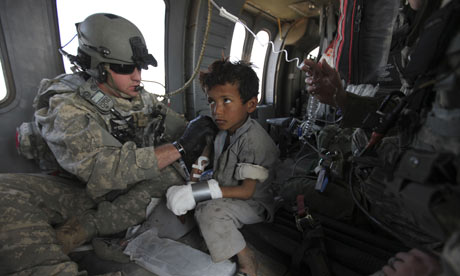The Observer
 • Nato commander committed to reducing number of casualties but toll continues to rise
• Nato commander committed to reducing number of casualties but toll continues to rise
• Average compensation paid by Britain to bereaved families falls from £7,300 to £2,900
Twenty compensation claims relating to the killing of innocent Afghan civilians during operations by the UK armed forces are being investigated by the Ministry of Defence.
In the past, Britain has paid an average of £7,300 for every civilian death in war, although the last figures available, for the year ending April 2009, show that figure had fallen to £2,900.
The issue of compensation for civilian casualties has moved to the top of the political agenda as Nato commanders place an increasing emphasis on securing the support of the Afghan population. Officials are already negotiating to establish a standard system of compensation payments among member states operating in Afghanistan.
Sarah Holewinski, executive director of Civic (Campaign for Innocent Victims in Conflict), said: "We've been working to get a uniform system set up for four years now, and we are hopeful that nations are finally prepared to push this through."
Britain still offers one of the most generous schemes to Afghan civilians. The US, for instance, pays a maximum "condolence" payment of £1,660 for civilian casualties, while Germany opts for a system of community aid rather than payments to individuals.
It is understood that payouts have been made to the relatives of 12 Afghans killed in a US rocket attack in the south of the country two weeks ago, signalling a new impetus among Nato forces to atone swiftly for mistakes.
Holewinski said: "There are signs that they are increasingly recognising that it must dignify and recognise civilians."
She hoped that the reduction in British compensation payments was an anomaly. The figures reveal that, during the year to April 2008, the MoD paid £73,000 for the deaths of 10 Afghan civilians. The next year, however, it paid only £32,000 to compensate the families of 11 dead Afghans. The trend was also mirrored in the size of payments to Afghan civilians who had been injured.
The 22 injured Afghans received an average of £1,400 in the year until April 2008, but an average of £1,060 during the following year. By contrast, injured British troops are entitled to a maximum tax-free lump sum of £570,000.
A significant increase in the number of legal claims lodged by Afghan civilians against the government is also evident with the volume of complaints for damage to property rising from 35 to 700 – 20 times higher – over the past two years. Payouts to damaged property trebled to £360,000 during the same period.
The number of legal claims lodged by Afghan civilians against the government stood at 2,120 between April 2008 and 2009. Of these, 736 have been settled with figures ranging from £18 to £9,500. The average settlement is £572.
An MoD spokesman said: "We have strict procedures, frequently updated in light of experience, intended to both minimise the risk of casualties occurring and to investigate any incidents that do happen. Compensation claims brought against the Ministry of Defence as part of the International Security Assistance Force are considered on the basis of whether or not the department has a legal liability to pay compensation. Where there is a proven legal liability compensation is paid."
Efforts to agree an official Afghan compensation scheme run parallel with last week's confirmation by General Stanley McChrystal, commander of Nato forces in Afghanistan, that he has ordered troops to limit night raids in an effort to win over the local population. His directive followed mounting complaints from Afghans who were enraged over foreign soldiers bursting into their homes as they slept.
Nader Nadery, a commissioner at the Afghanistan Independent Human Rights Commission, said: "After civilian deaths, night raids had become the second biggest issue for Afghans."
An inquest into one night raid in Narang district, eastern Afghanistan, in which eight boys from one family were killed, is continuing, with Nato officials keen to pinpoint the source of the faulty intelligence that led to the blunder. The Observer has been told that McChrystal's directive stemmed directly from the incident. The family involved have yet to receive compensation for the attack, which is believed to have involved covert US and Afghan forces.
A report by the New York-based Open Society Institute, which promotes democracy, has identified 98 civilians who were killed during night raids in 2009. The report also flagged allegations of ill-treatment, aggressive behaviour and cultural insensitivity.
"Afghans gave accounts of international forces tearing or chopping the Qur'an with an axe, taking women away in helicopters and returning them dead, and shooting babies or children at point- blank range," the report states.
Although McChrystal has focused his military strategy on reducing civilian casualties, the toll continues to mount. Last Sunday a Nato air strike killed 27 civilians, including several women and children, in Uruzgan province, southern Afghanistan, prompting a public apology from McChrystal.

No comments:
Post a Comment